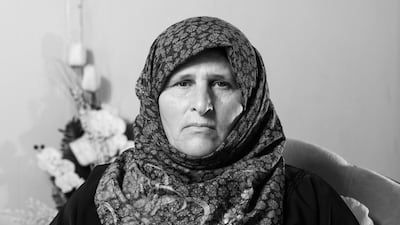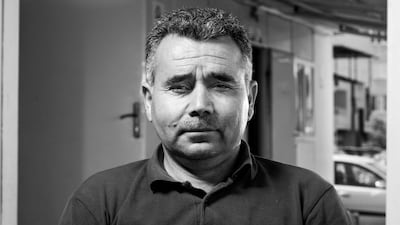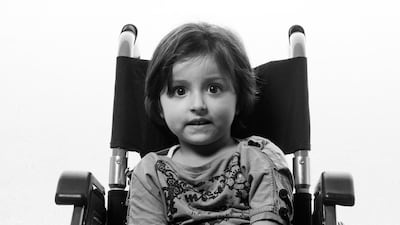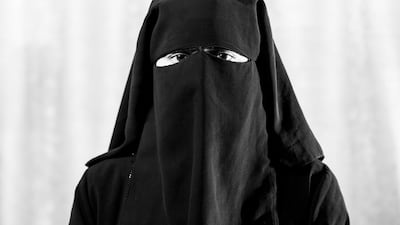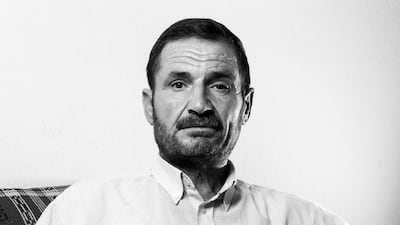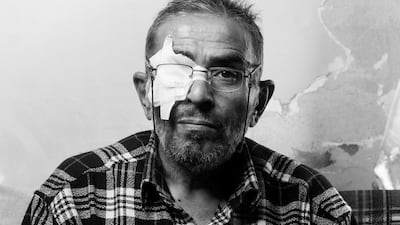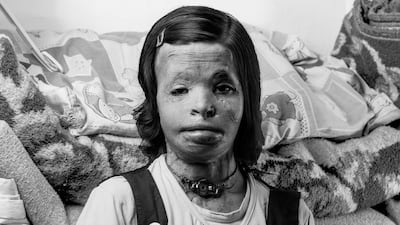The California-based NGO International Medical Corps (IMC) marked the sixth World Refugee Day since the Syrian civil war broke out with a new photography project. The Face of the Refugee Crisis, which is funded along with IMC by the European Union, is a series of 40 arresting portraits, each paired with small biographies, from the German photographer Deniz Calagan. Taken over nine days in southeastern Turkey in May, they offer both an autopsy of the war-to-date and moving insights into these refugees' lives. Here are 10.
Mufide Sattouf, 55, Kirikhan, Turkey — Fled from Kafar Zaita in 2012
Every day Mufide and her family prayed for the shelling and bombs not to fall — but the violence continued, and her family joined the thousands fleeing Kafar Zaita — a city 30,000 strong that became so hellish that it is now reduced to the last 500 inhabitants.
Living in Turkey with her husband and eight children, she is aware that abandoning her home has saved her from the ‘living death’ she was experiencing inside Syria.
Her husband suffers from hypertension diabetes, while Mufide has to take regular medication to deal with an arthritic condition which makes her joints ache. They both use the International Medical Corps Primary Health Centre in Kirikhan — a programme set up to help refugees like them access medical care and a service which provides between 400 and 500 consultations a day.
“When I go to sleep now I know I am safe — that is the most important thing.
“One day I will go back, that is what I hope for more than anything — the chance to be safe in my own village. That’s what I pray for now.”
Favzi Muhammed, 53, Kirikhan, Turkey — Fled from Hajal Al Aswad in 2013
Most people are thankful for the fact that they will never have to leave their homes, their family and their livelihoods behind because they fear for their lives.
Favzi has had to do it twice.
In 1967 he was forced from his home in Golan ahead of the Israeli army — a conflict which left the area effectively annexed by Israel. He sought safety in the Syrian city of Damascus, which he intended to make his temporary home until he could return. Some 46 years later it was another army he was fleeing from — one drawn from within his own country.
“Each week people took part in demonstrations and each week people were shot. There were massacres — a lot of innocent people were being killed.
“I found out that my sons and I had been identified as ringleaders in the demonstrations. We were set to be picked up by the security forces — so we fled again, over the border to safety.”
He now works as a security guard, protecting International Medical Corps’ Primary Health Centre in Kirikhan, and helps translating for patients and registering newcomers.
Muhziye Al Bakri, 4, Kirikhan, Turkey — Fled from Idlib in 2015
“I was one kilometre away when the airstrike happened,” says Muhziye’s father. “I could see the explosion.”
Muhziye’s father reached his home to find his neighbours trying to dig his family out of the rubble.
“There was blood everywhere — I thought I was looking at the TV news.”
Inside the engineer’s two wives lay dead, while four of his five daughters were facing life-threatening injuries. The worst was Muhziyem, who had shrapnel injuries to her spinal cord, ruptured bowels and the right side of her pelvis and femur smashed away.
The little girl now comes to International Medical Corps’ Primary Health Centre in Kirikhan regularly to have her stitches checked and colostomy bag changed.
“What happened to us was our destiny,” says Muhziye’s father, “but now we are safe and my daughters are going to school. They have a future.”
Anonymous, 17, Reyhanli, Turkey — Fled from Homs in 2014
The stigma around mental health within the refugee population remains strong — despite efforts to overcome that prejudice.
Epilepsy has already robbed this teenager of her education and contributed to her divorce — so she is determined not to let it affect her future.
Before fleeing from the Syrian city of her birth amid the rain of bombs, the condition had become so bad that she was kicked out of school after suffering regular seizures.
Anything that made her sad, angry or frustrated could bring one on. Working with the International Medical Corps’ mental health support workers in Reyhanli she found a solution.
“I came here seeking help — what I found were people who understand my life, who can share the pain together. I can be truly relaxed.”
The voracious reader, she keeps returning for more books, keeps meticulous diaries and is a leading member of the group sessions that provide so much hope to those with similar conditions.
“I can feel optimistic now — people should always be optimistic and seek help. There’s no need to feel ashamed,” she said.
“All I wish for now is for time with my family, and a resolution to the conflict in Syria — so we can return to our home.”
Traad Al Ahmad, 53, Reyhanli, Turkey — Fled from Idlib in 2012
One of the biggest problems facing refugees in Turkey is trying to earn money — often their skills and qualifications are not enough to secure the sort of work they are able to do.
Traad was headmaster at a school in his hometown — a job he left behind when he, his wife and their young children decided to make their way to Turkey to avoid the shelling that was taking place around them.
Carrying their youngest at just five years old to the border, across a river and over many miles on foot, the journey to safety took the family one month. At one stage they went four days without food.
But in Turkey work was hard to find and Traad returned to Syria to try to collect his wages.
While there he came under an attack with barrel bombs and suffered a stroke. He was left bedbound in hospital, making his way back to Turkey with the support of his brother.
Traad receives physiotherapy several times a week at his home — provided by International Medical Corps’ mobile medial unit — and he can now walk without a stick, stand unaided and use his right arm.
“The real change has been psychological — now I can go outdoors, I can walk in the street and visit friends. This has made a real difference to my life.”
“It’s not a question of if I will go back to Syria, it’s a question of when I can.”
Bchra Al Mahad, 12, Kilis, Turkey — Fled from Aleppo in 2015
It was foggy when the soldiers came.
The family used a van to escape, but they were quickly halted at gunpoint by troops — men determined to rob them of everything they owned.
“I shouted ‘just give him everything’,” says Bchra’s mother, “but afterwards they still ordered us out of the lorry, they made us line up and shot us at point blank range.”
Bchra’s father was killed, her mother wounded and her own spine was severed by a bullet in the neck. She would never walk again — paralysed by the gun of a mercenary from outside Syria.
In Kilis the International Medical Corps’s team has been working with the Blue Crescent organisation to rehabilitate her. An electric wheelchair was even found — a rare and valuable piece of equipment, but she was still too ill to use it.
“I was so happy, but then disappointed when she couldn’t use her fingers and steer it.”
Bchra worked hard with her case worker and then a breakthrough happened — she began to use her fingers to move the chair.
The little girl’s future is now uncertain — she requires specific treatment in Europe, which is unavailable to her in Kilis.
“She is my only child — what did she do to deserve being treated this way?”
Mostafa Entabee, 54, Kilis, Turkey — Fled from Aleppo in 2012
Mostafa had worked hard throughout his life as an accountant in a government office, saving money carefully and raising a family of bright children who had started going to university.
When he retired, he had plans to take things easy and focus on supporting his children’s future where he could. Then the war started.
“All that fell away in a heartbeat — can you imagine how frustrating it is to see a life’s work gone? A normal life, just gone?”
His health began to deteriorate too and he was diagnosed with diabetes — a condition that he blames on the conflict. Since beginning work with International Medical Corps’ case workers he has also been found to be suffering from a kidney problem and has issues with his eyes.
He is sick and he believes being a refugee has made accessing medical help harder.
“Syrian people need more attention, more access to doctors and medical experts. This is my plea.
“I’ve got to the point where I’m thinking about going back to Syria to die.”
Rime Abd Al Rahman, 12, Gaziantep, Turkey- Rushed from Aleppo in 2014
Rime’s home was bombed because they lived close to a military commander. The bomb caused the stove in her house to explode, killing her mother and causing severe burns to her and her two siblings.
She was one of those rushed to a Turkish hospital where she faced a number of live-saving operations in hospital and frequent skin grafts. She tried to return to Syria to live with her grandparents, but had to go back to Turkey for more treatment.
Rime receives specialist care from International Medical Corps’ medical team in Gaziantep — they massage her face and provide treatment to reduce the scaring she has suffered. Due to a tightening of the tendons in her hands she also requires regular support to stretch them and build up the muscles.
This work has had a huge impact. An avid fan of computer games, Rime has seen a major improvement in her dexterity.
Sadly her condition will not improve much further without plastic surgery — a treatment she is struggling to secure. Without it she won’t be able to return to school — something she dreams of all the time.
Leila Yonnis, 21 years old, Antakya, Turkey — Fled from Kobane in 2014
Leila is a young woman with big ambitions. She wants to be a fashion designer, she wants to study fashion in Italy and she wants to ensure Kobane’s creative culture is recognised around the world.
But in 2014 all she wanted was to escape the clutches of the Islamic State, her family walking in single file across a minefield to safety — the then-teenager shouldering a burden of luggage weighing more than her body.
“We knew that the Kurdish forces were battling Daesh, but when the radio said “They’re coming”, we had to leave and run to Turkey.”
Fluent in English, she quickly secured work as a translator for International Medical Corps. She is now a rehab programme officer, supporting her family in Turkey and in charge of securing the support equipment that they need, administrative tasks and helping budget the projects.
“We need to address the financial issues many are facing — provide a special needs fund to provide financial support to those most vulnerable, say for transport to medical care or to adapt people’s homes where necessary. We also need to add occupational courses so that these people can return to work — allow them to help themselves. We also need to improve access to facilities for disabled people — these are all vital things.”
‘Hafez Al Saoud’, 24 years old, Urfa, Turkey — Travelled from Deir ez-Zor in 2014
The Arabic equivalent of ‘Joe Bloggs’ - ‘Hafez Al Saoud’ — is a former Free Syrian Army fighter who fears that if he was recognised, his family in IS controlled Syria will be kidnapped and he will be blackmailed to return to his death.
“They are wild people. When I was there I had to make a decision: fight for Daesh, be killed by Daesh or fight Daesh. I chose to fight them.”
Leading a group of FSA fighters who had fought all night for control of a village outside the city of his birth, they chose to retreat in the twilight. As they pulled back he was hit by a sniper’s bullet in the chest, hitting his spine and paralysing his legs.
“I begged for my friends to help me. If I had been on the ground for five minutes more Daesh would have had me — they would have shot me where I lay. They don’t have minds for thinking.”
While in a Syrian hospital he heard that IS were approaching once again and he was rushed to safety over the Turkish border.
After eight surgeries in Turkish hospitals, he was admitted to the Bunian Centre in Urfa and met the International Medical Corps physiotherapists who would help him walk again.
It will take the 24-year-old another year to fully recover — he is still using the crutches he was given and requires a lot of work on his balance, but he no longer needs a wheelchair and his plan remains to walk unaided once again.
“I felt like dying when I saw people acting normally — but now I want to help others like I have been helped. I want to learn physiotherapy for myself — and then I can provide this care free of charge.”
